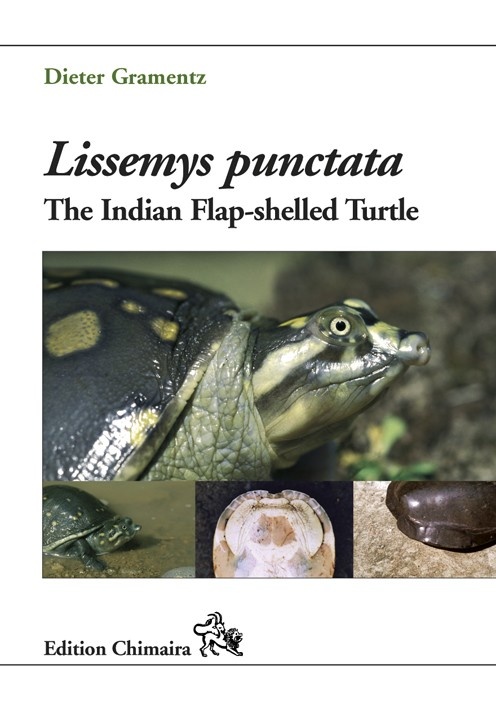| Series | Frankfurter Beiträge zur Naturkunde |
| Author | Dieter Gramentz |
| ISBN | 9783899734966 |
| Publisher | Edition Chimaira |
| Language | English |
| Pages | 280 |
| Format | Hardcover |
| Images | Colour images |
| Year published | 2011 |
Based upon the vast area and homogeneity of its distribution the ecological very flexible Indian flapshell turtle (Lissemys punctata), which occupies the entire Indian subcontinent from Sri Lanka up to the Himalaya in the North, is a very successful turtle species. It survives long periods of drought and, although being an aquatic turtle species, is capable of walking long distances on land if it has to. It is able of tolerating rather high ambient temperatures, and will bury into the ground during extreme hot or cold weather situations until conditions improve. The Indian flapshell turtle has developed very effective means to prevent becoming too easily the prey of other animals and can survive the loss of one or two legs. Because of its small size in comparison to the majority of the other softshell turtles it is easier to keep it in captivity, making it one of very few trionychids of which courtship and copulation behaviour have been observed.
Nowadays the Indian soft shell turtle is generally considered the most primitive or one of the most primitive trionychid turtles. Anatomically Lissemys punctata differs in a number of aspects present in most of the more advanced other softshell turtles. Actually it shares many features of hard-shelled turtles, such as retention of small peripheral bones, a rather small size and relatively high or humped carapace. The species offers an interesting opportunity of study and documentation of coevolution: no other softshell turtle species have been found with more endoparasites.
Many aspects of our information is still very incomplete as there is an imbalance in the state of knowledge between anatomical-physiological data and ecological-behavioural data.
For decades Lissemys punctata has been killed and eaten by the ever-growing population on the Indian subcontinent, in the order of several tens of thousands per year. To make a bad situation worse, a recent threat is that Indian flapshell turtles are exported to markets in far East-Asia on an increasing scale. So, sad as it is, besides the Chinese softshell turtle (Pelodiscus sinensis), the Indian flapshell turtle is certainly one of the most exploited and killed trionychid turtle.
his book tries to compile all relevant and available information of Lissemys punctata into one volume for a better understanding of this turtle species.
















